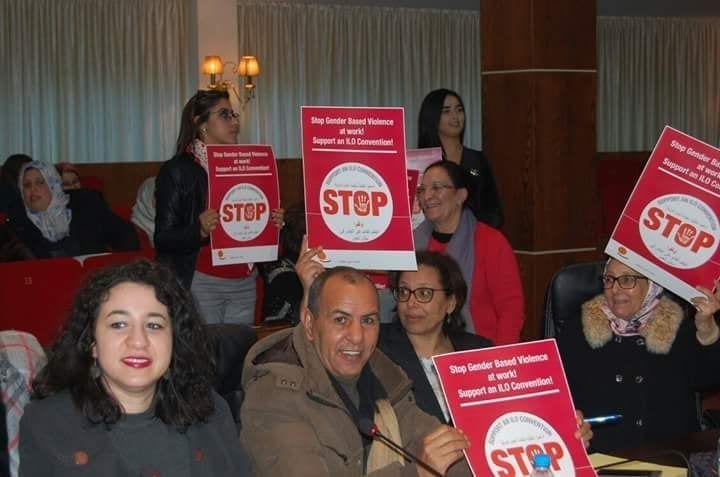
Mar 8, 2018
Women union activists and their allies in Morocco and Tunisia celebrated International Women’s Day this week with events that highlighted the need for a global standard to address gender-based (GBV) violence at work.
“Violence is escalating dramatically. Without an international agreement and deterrent laws that protect women at home, in society and in workplaces, we cannot move forward,” says Saida Ouaid, a member of the Executive Office of the Democratic Confederation of Labor (CDT) in Morocco.
Ouaid and other women union leaders and allies took part in a March 6 event “Toward an International Convention for the Elimination of Gender-Based Violence in the Workplace” at the Parliament in Rabat, in coordination with Morocco’s Secretariat of Equity and Equality.
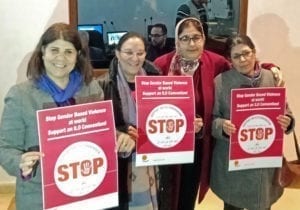
Touriya Lahrech (far left),coordinator of the CDT’s Women Department, joins women union members to discuss an ILO convention addressing gender-based violence at work. Credit: Mohamed Yakkane
The International Labor Organization (ILO) is considering a convention (regulation) that would address violence and harassment against workers. The Solidarity Center is part of an International Trade Union Confederation (ITUC) campaign for passage of a strong ILO convention.
In Tunisia, 100 union members from across the country gathered for a March 8 event where they also discussed the need for passage of an ILO convention on gender-based violence at work.
“The gathering is an opportunity for women to stand up for their struggles to defend their rights and freedom, and to promote equality and an environment free of violence,” Samir Al-Shefi, deputy general-secretary of the General Union of Tunisian Workers (UGTT) Women, Youth and Association, said in opening the event.
Naima Hammami, one of two women on the UGTT’s executive office, paid tribute to the struggles of Tunisian, Palestinian, Syrian and Arab women around the world. The event was sponsored by UGTT’s Women, Youth and Association Department, together with the Solidarity Center.
Gender-Based Violence ‘Widespread at Work’
At both the Morocco and Tunisia events, experts discussed preliminary findings on gender-based violence at work based on participatory field research sponsored by the Solidarity Center and CDT in Morocco and the UGTT in Tunisia.
Discussing the research in Morocco, Najat Al-Razi, a gender specialist and sociologist, says gender-based violence is “widespread in the world of work,” and “the most common form of violence against women in workplaces is sexual harassment.”
Asma al-Marani, a member of the Moroccan Union of Labor and the Arab Trade Union Confederation, pointed out that her union receives daily complaints about violence at work from women working in the precarious and informal economy.
CDT leaders noted that as part of the global campaign for an international convention on the elimination of violence in the world of work, the union will continue meeting with a range of allies at the grassroots level until the Geneva Conference with a campaign to push the government to support the ILO draft convention, supplemented by a guiding document implementing the convention.
Representatives from the Njda Center, the Jusour Association, the Women’s Labor Union, the Association of Women for Equality and Democracy (Afed) and other union leaders and journalists also took part in the Rabat event.
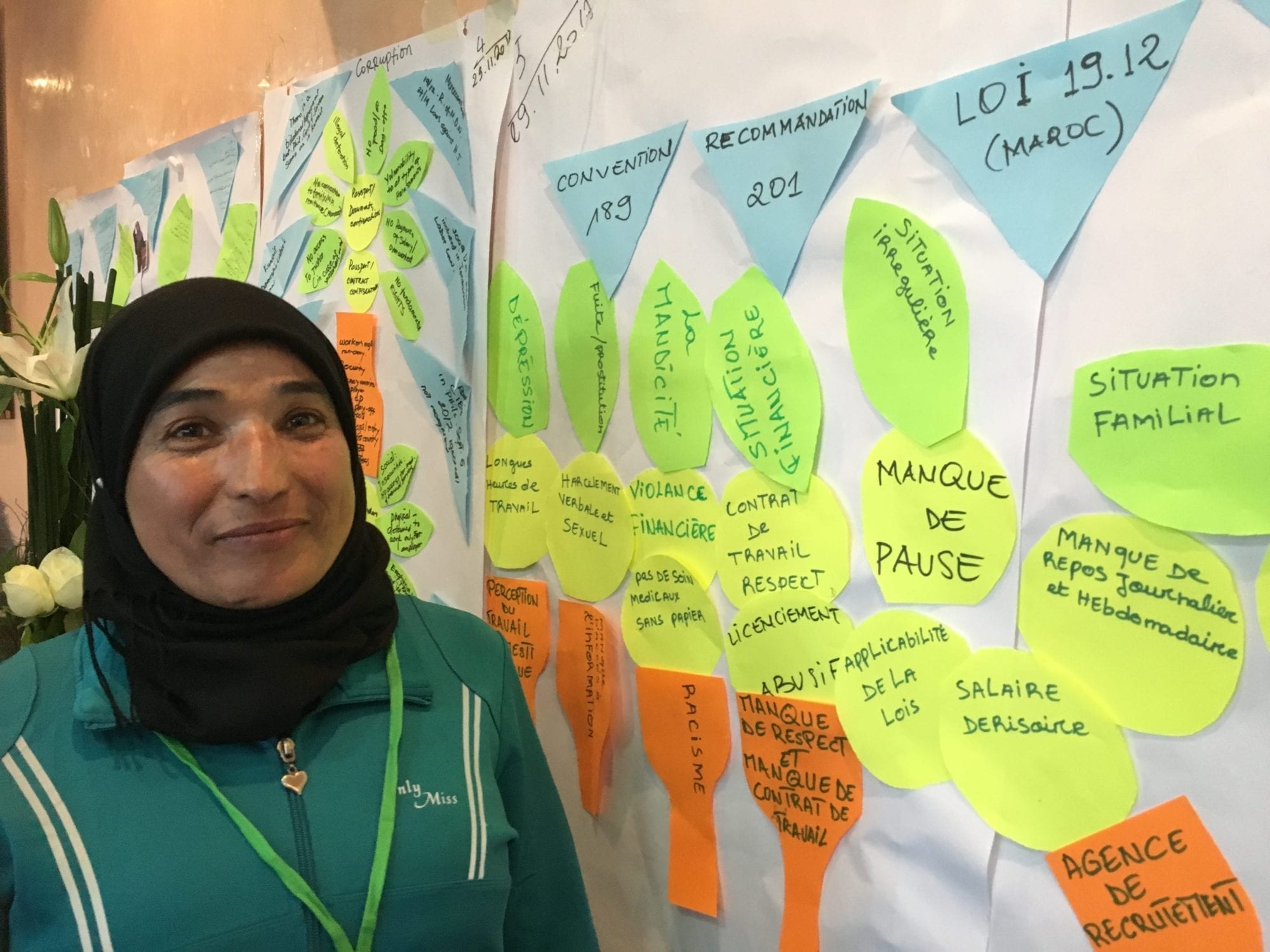
Mar 7, 2018
Sorting olives, picking peaches and cultivating fields across a vast agro-industrial complex outside Meknes, Morocco, Hayat Khomssi says women workers like her once did not have access to higher-skilled jobs and leadership positions. But after she and her co-workers took part in Solidarity Center gender equality trainings and other skills-building workshops, more than 1,000 farm workers at the Les Domaines Brahim Zniber farm in 2015 negotiated their first collective bargaining agreement.
“Now we have achieved a similar status to that of the men,” she says, speaking through a translator. “Now women are able to be supervisors, team leaders, and are able to do pruning as well. Now they are equal to men in term of tasks but also in terms of pay.”
This year, International Women’s Day draws attention to the rights and activism of rural women like Khomssi and her co-workers, echoing the priority theme of next week’s 62nd session of the United Nations Commission on the Status of Women (CSW) in New York City.
Celebrated annually on March 8, International Women’s Day this year builds on the current #MeToo movement for women’s rights, equality and justice, with women union activists and their allies holding marches, taking part in social media campaigns and hosting events around the globe to call for gender equality in wages, working conditions, political representation and more.
Follow UN Women’s Day events on Twitter with the hashtag #TimeIsNow.
Women’s Empowerment through Collective Bargaining
Morocco farm women will be among several rural women union activists discussing their advancements through gender equality training and collective bargaining on a Solidarity Center panel at the CSW, “Rural Agricultural Women Workers Organizing to Increase Equality and Empowerment.” They will be joined by Ayat Al Bakr, a Jordanian agricultural worker.
Some 564 million women work in agriculture, and those in commercial agriculture are predominantly concentrated in temporary, informal and seasonal jobs, where they receive low wages and few or no benefits, and are exposed to dangerous and unsafe working conditions.
A key part of Solidarity Center gender equality training involves exploring strategies for addressing gender-based violence at work. Gender-based violence (GBV) is one of the most prevalent human rights violations in the world—yet not enough is done to prevent it, especially at the workplace.
Globally, after years of campaigning by workers and their unions, the International Labor Organization (ILO) is negotiating a standard addressing gender-based violence at work. Workers around the world could have access to a binding international standard covering gender-based violence at work after it is finalized. The Solidarity Center is working with the International Trade Union Confederation (ITUC), which is coordinating the global union campaign for its passage. Find out how you can get involved.
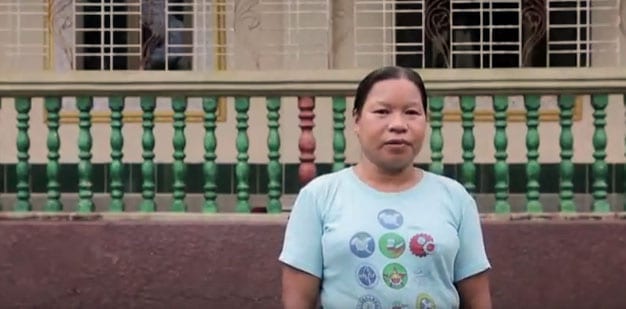
Mar 1, 2018
Hello. I am Daw Tin Tin Thein. I am 43 years old. I have worked in this factory for nine years. I am responsible for sanitation and garbage collection in this factory. It means I am responsible for keeping this factory clean and tidy.
I have been a member of the trade union for four years. During these four years, I found that the negotiations and coordination between the factory owner and the CBA [collective bargaining agreement] have resulted in many successful resolutions.
Workers receive salaries and minimum wages. Workers also enjoy transportation services and social security benefits. We conduct educational activities under the leadership of CTUM [Confederation of Trade Unions-Myanmar].
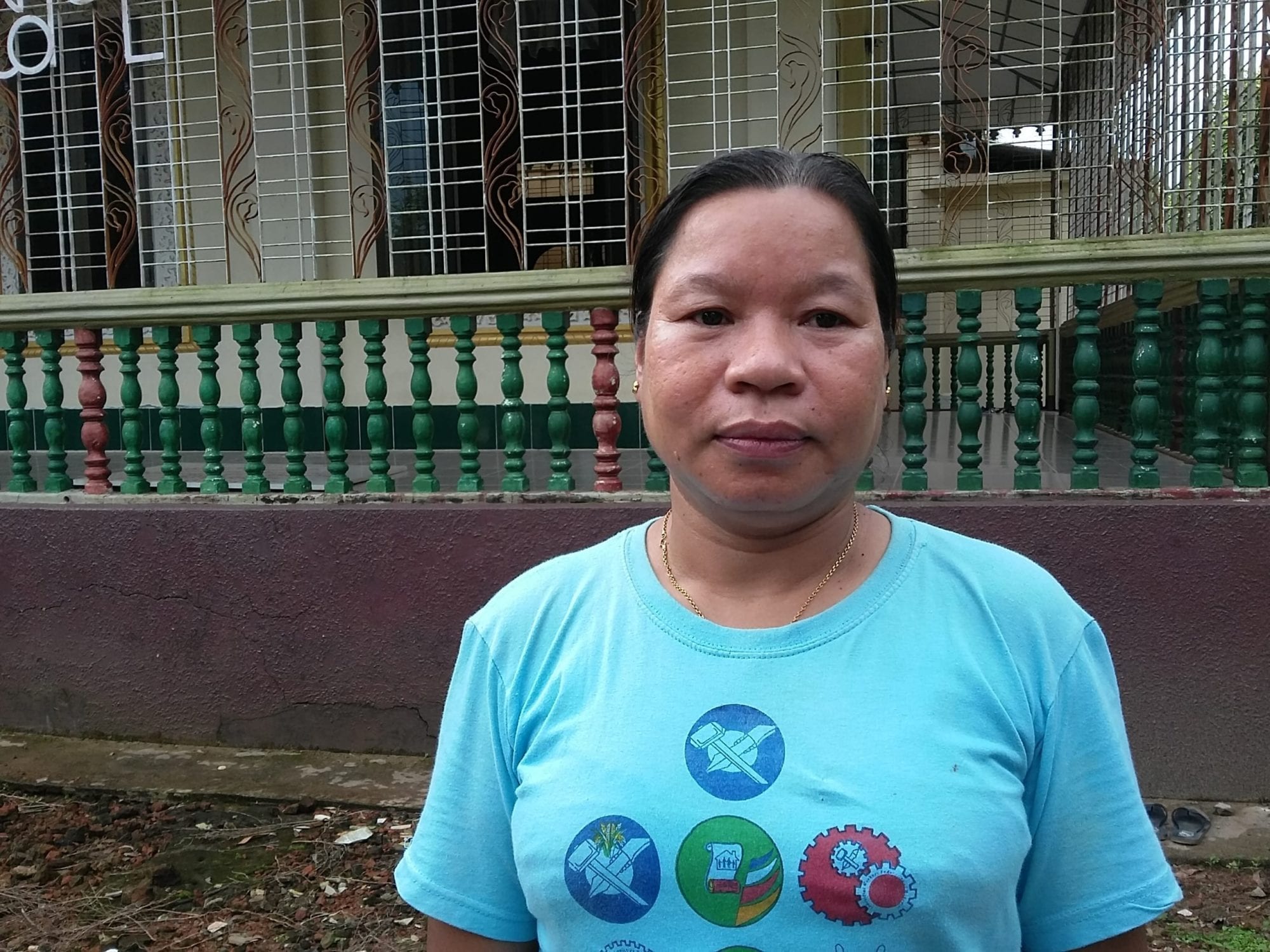
Mar 1, 2018
Daw Tin Tin Thein, 43, works in a factory just outside Yangon, Myanmar’s capital, where workers ground and mold clay for building materials like floor and roof tiles. Thien, a janitor, beams with pride when she describe how she is responsible for “keeping the factory clean and tidy.”
As a member of the Confederation of Trade Unions-Myanmar (CTUM), she says workers receive social security benefits and have access to educational opportunities.
Thein is among workers whose unions and associations the Solidarity Center works with around the world—and she tells her story at the Solidarity Center Workers Equality Forum.
At the Workers Equality Forum, domestic workers from Kenya, garment workers from Cambodia, factory workers in Honduras and many others share their struggles on the job and often, how they are winning rights on the job through their unions.
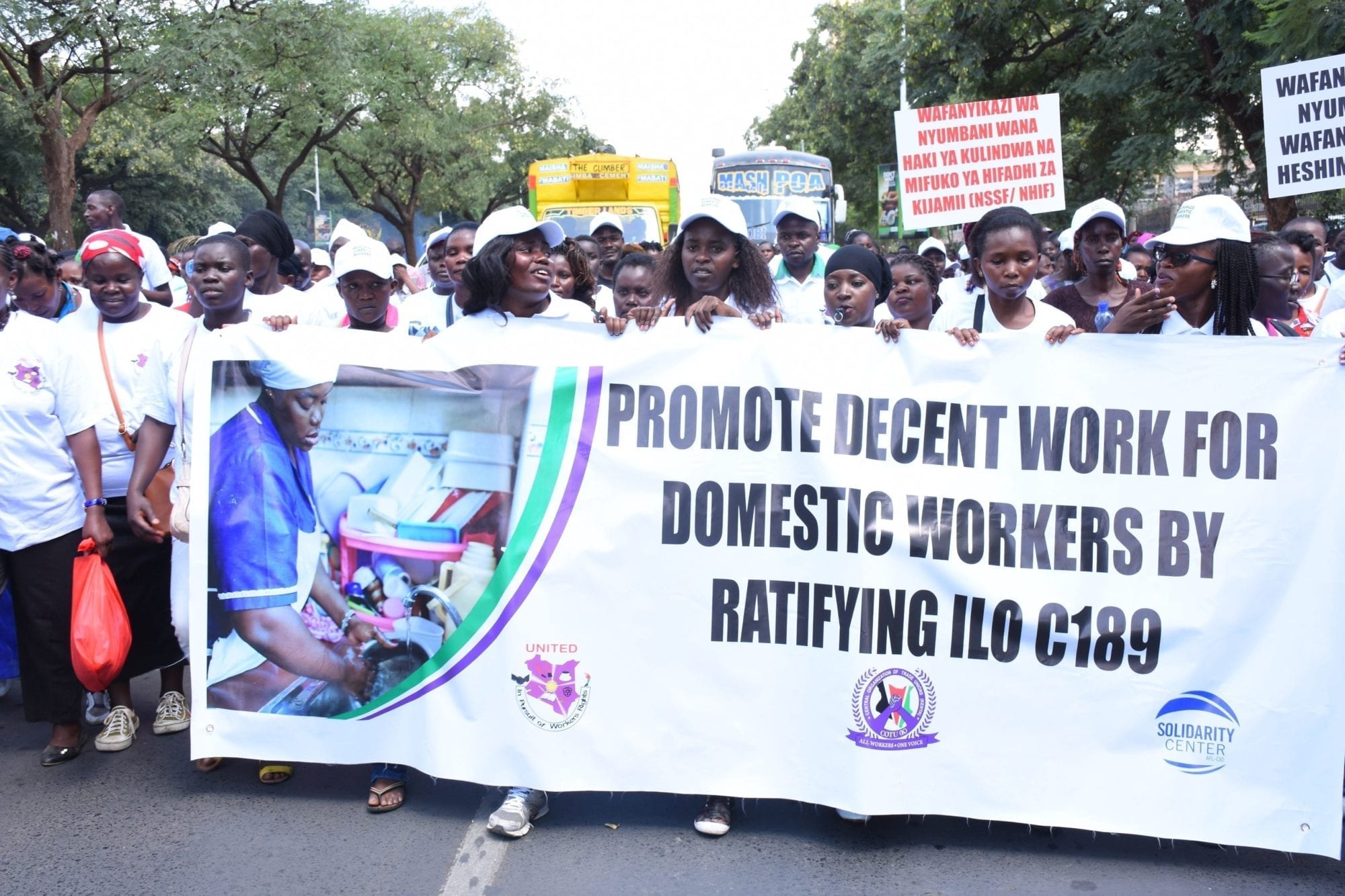
Feb 21, 2018
Hundreds of domestic workers rallied in front of the Kenya Parliament in Nairobi today, lobbying legislators to ratify International Labor Organization (ILO) Convention 189, Decent Work for Domestic Workers. The effort is part of a larger campaign to improve wages and working conditions for the country’s domestic workers by the Kenya Union of Domestic, Hotel, Educational Institutions, Hospitals and Allied Workers (KUDHEIHA) as well as to help build momentum for a global movement for domestic workers.
“It is amazing. It shows [the] power of the domestic workers in Kenya,” said Africa Regional Coordinator for the International Domestic Workers Federation (IDWF), Vicky Kanyoka.
Convention 189 established the first global standards for the more than 50 million domestic workers worldwide, addressing wages, working conditions, benefits, labor brokers and child labor. Although the convention went into force in 2013, it has been ratified by only 23 countries. Of these, only two African countries have ratified the convention: South Africa and Mauritius.
Domestic workers are some of the world’s most vulnerable workers, comprising a significant part of the global workforce in informal employment. In Kenya, domestic workers have suffered pay below minimum wage, long working hours, physical abuse, discrimination and lack of job security. More recently, domestic workers migrating to jobs in the Middle East from the Mombasa area, in an effort to escape poverty wages at home, have been preyed upon by unscrupulous labor brokers and employers.
KUDHEIHA—a Solidarity Center partner—has stepped up its political advocacy on behalf of domestic workers with the support of the Solidarity Center in recent years. Legislative changes favorable to domestic workers included an increase in their minimum wage in 2015 as well as an increase last year in the minimum wage from 10,955 to 12,825.72 Kenyan shillings ($108 to $126) per month.
KUDHEIHA’s current push for government ratification of Convention 189 is an effort to secure additional recognition, rights and standards for Kenyan domestic workers working inside and outside the country.
The Solidarity Center works with domestic workers and other organizations that represent them around the world, including in Bangladesh, Cambodia, Costa Rica, Dominican Republic, El Salvador, Indonesia, Jordan, Kenya, Liberia, Mexico, South Africa and Sri Lanka.






